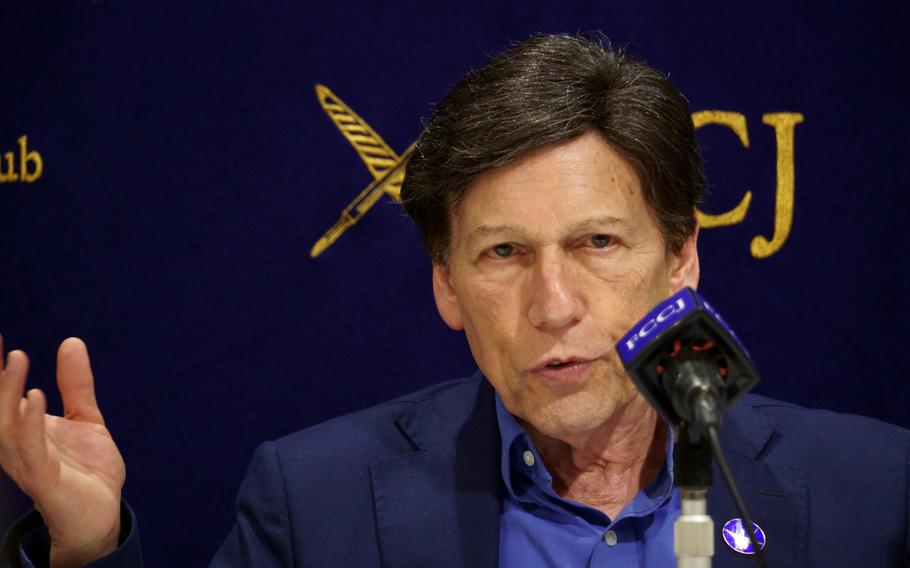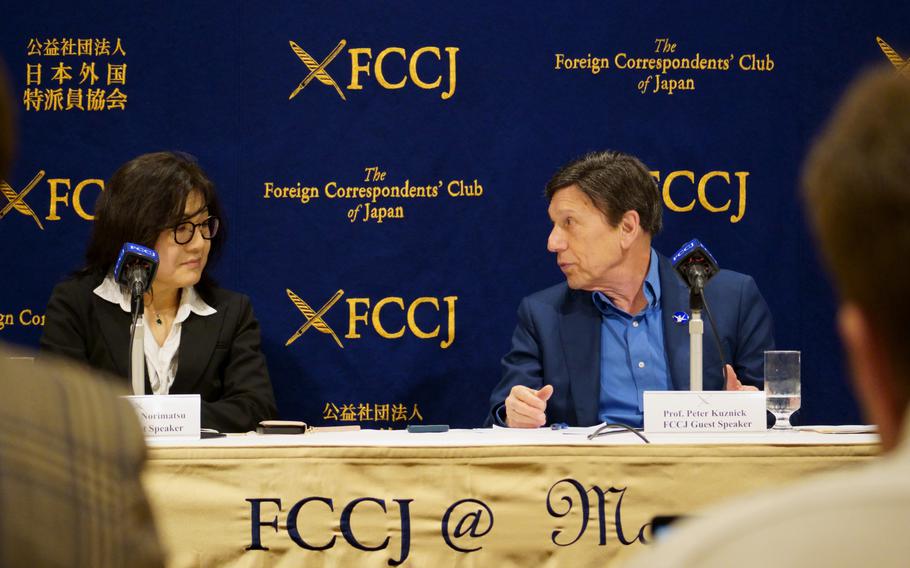
Peter Kuznick, professor of history and director of the Nuclear Studies Institute at American University, speaks at the Foreign Correspondents’ Club of Japan in Tokyo, Feb. 7, 2025. (Akifumi Ishikawa/Stars and Stripes)
TOKYO — An American professor and a Japanese author, speaking to reporters Friday in the Japanese capital, said their nations should take a less militaristic approach to challenges in the region.
Peter Kuznick, professor of history and director of the Nuclear Studies Institute at American University in Washington, D.C., and Japanese author and journalist Satoko Norimatsu spoke at the Foreign Correspondents’ Club of Japan.
“Japan is planning for aggressive military action in a way that would have been unthinkable 15 to 20 years ago,” Kuznick told the reporters. “Japan is already doubling its defense spending. This is just a waste of human talent, creativity and manufacturing resources.”
President Donald Trump is likely to ask for more defense spending by Japan, beyond its already record levels, but Kuznick suggested the money would be better spent on non-military projects.
“You never know with Trump, is the thing,” he said. “He’s on all sides of most issues, but we do know that, whereas (Chinese leader) Xi Jinping and the Chinese like to talk about win-win diplomacy, Trump talks about zero sum gain. We win and you lose.”
Trump wants to engage in economic warfare much more than he wants to engage in military warfare, Kuznick added.
“I prefer economic to military if I have to choose, but it’s always this bullying approach,” he said.

Author and journalist Satoko Norimatsu and Peter Kuznick, professor of history and director of the Nuclear Studies Institute at American University, speak at the Foreign Correspondents’ Club of Japan in Tokyo, Feb. 7, 2025. (Akifumi Ishikawa/Stars and Stripes)
Kuznick and Norimatsu recently visited Okinawa and surveyed American military sites there at the invitation of prefectural Gov. Denny Tamaki, an ardent opponent of the island’s U.S. presence, Kuznick said.
“The context in which I look at Okinawa is the context of the growing militarization of the Pacific,” Kuznick said.
Beijing feels it deserves to be the dominant force in the Pacific and is building up its military, he added.
“China is asserting itself and the United States is trying to counter that,” he said, listing defense agreements and efforts to strengthen American military power in the Indo-Pacific.
Diplomacy has become a dirty word in the United States, Kuznick said, while suggesting the administration of former President Joe Biden was only minimally engaged in foreign relations.
Trump has said he wants to be a peacemaker, while coincidentally calling for the Gulf of Mexico to be renamed the Gulf of America and threatening to repossess the Panama Canal.
“Under Trump we don’t know yet,” he said.
The outlook for Okinawa under the new U.S. administration seems dire, Kuznick said. Trump boosted diplomatic ties and arms sales to Taiwan during his first term, the professor noted.
“My big fear is that if war should ever break out, Okinawa might not be the first target, but it will probably be the second target for the Chinese,” he said.
Meanwhile, Norimatsu, co-author of “Resistant Islands: Okinawa Confronts Japan and the United States,” told reporters that most Japanese people are brainwashed to allow American control over their land and air.
The U.S. Air Force in Japan, with headquarters at Yokota Air Base in western Tokyo, controls airspace over the Japanese capital, she said.
“People in Tokyo don’t seem to care,” she said. “It’s not secret. Why do we allow this to happen? If this was China or Russia or Korea or Germany or wherever, if this was another country would Japan actually allow it? No.”